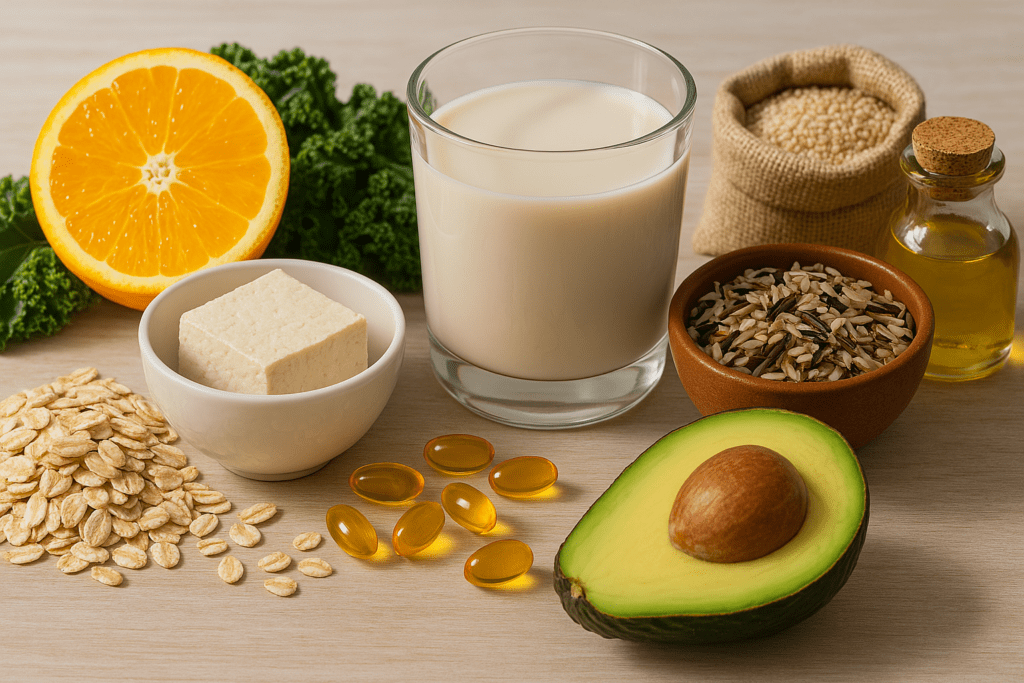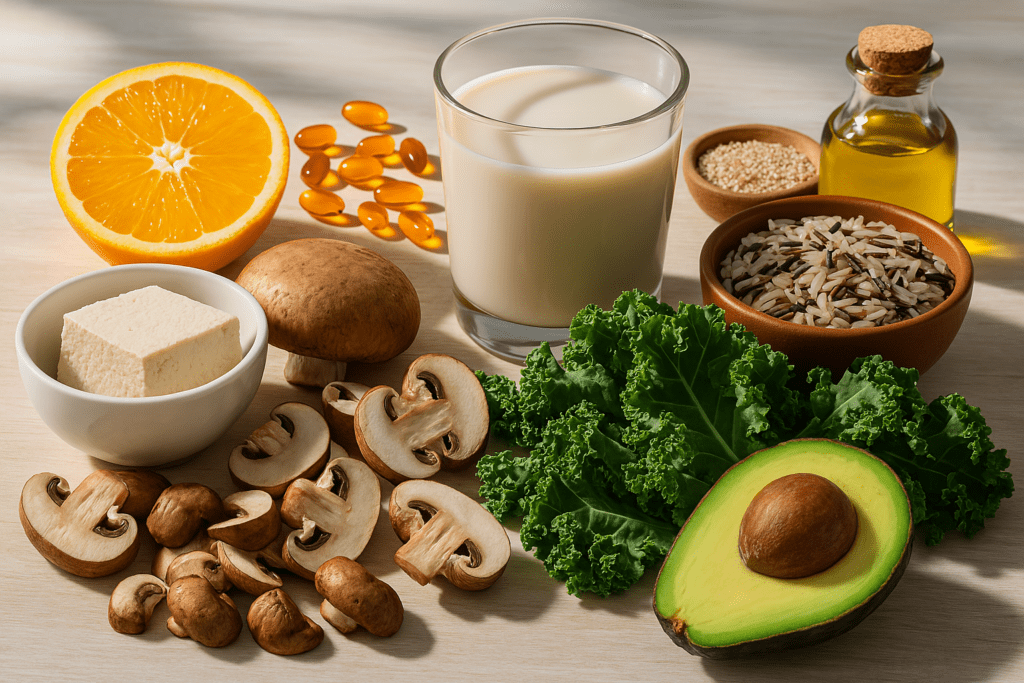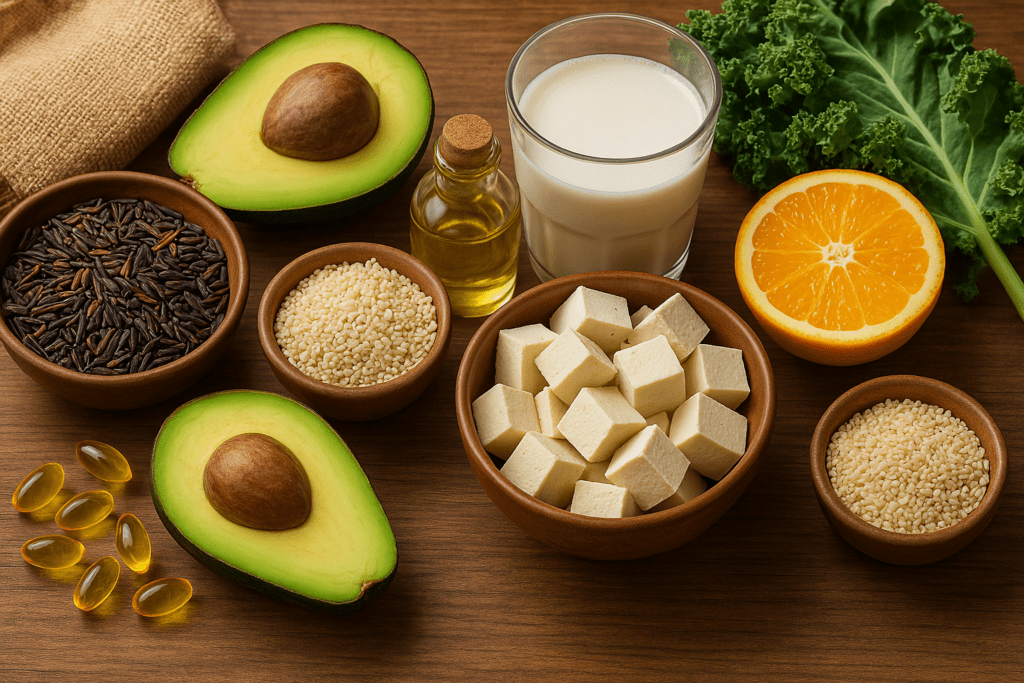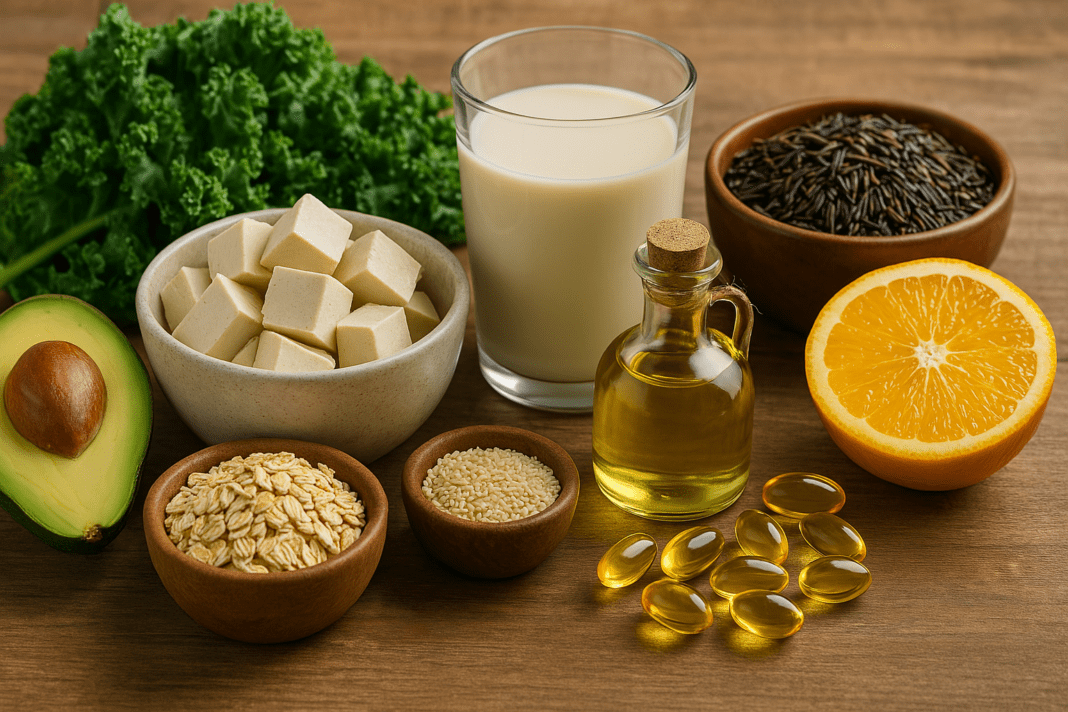Vitamin D is often dubbed the “sunshine vitamin” for good reason. While our bodies can synthesize it when exposed to sunlight, many people—especially those living in northern latitudes or spending much of their time indoors—struggle to get enough through sun exposure alone. For individuals following a vegan lifestyle, the challenge becomes even more nuanced. Traditional sources of vitamin D are frequently animal-derived, leaving vegans in search of alternative strategies to meet their needs. This article explores how to obtain adequate vitamin D as a vegan, highlighting both natural and fortified vegan foods containing vitamin D, as well as supplementation options specifically suitable for plant-based eaters.
You may also like: Best Plant-Based Carbs for Energy and Health: What Science Says About Vegetarian Carbohydrates
Understanding the Role of Vitamin D in the Body
Before diving into the best vegan sources of vitamin D, it’s important to understand the crucial functions this nutrient performs. Vitamin D plays a central role in calcium absorption and bone health, helping to regulate calcium and phosphorus levels in the bloodstream. It also supports immune system function, influences cell growth, and is thought to contribute to mood regulation. Recent studies have linked vitamin D deficiency to a variety of chronic health issues, including osteoporosis, cardiovascular disease, and autoimmune conditions.
Vitamin D exists in two main forms: D2 (ergocalciferol) and D3 (cholecalciferol). D2 is found in some plant-based sources and is commonly used in fortified foods, while D3 has traditionally been derived from animal sources like lanolin (from sheep’s wool). However, recent innovations have led to the development of vegan D3 supplements sourced from lichen, making it possible for vegans to access the more bioavailable form without compromising their dietary ethics.

The Challenge of Getting Enough Vitamin D as a Vegan
Vegans and vitamin D have a complicated relationship, primarily because the most well-known natural sources—such as fatty fish, liver, and egg yolks—are not suitable for those avoiding animal products. While sunlight remains a potential option, its reliability depends on geographic location, season, skin pigmentation, and lifestyle factors such as indoor occupations or clothing habits.
Compounding the issue is the relative scarcity of vegan foods high in vitamin D. Even among the plant-based options that do contain this nutrient, the amounts are typically small, and consistency in intake can be difficult to maintain. Moreover, the form of vitamin D found in plants (D2) is generally considered less effective in raising blood levels of the nutrient compared to D3. This makes it especially important for vegans to understand how to optimize their intake through a combination of fortified foods and well-chosen supplements.
Vegan Foods Containing Vitamin D: What Nature Offers
Among the few natural vegan foods containing vitamin D, mushrooms are the standout option. Specifically, mushrooms exposed to ultraviolet (UV) light during growth can provide significant amounts of vitamin D2. Varieties such as maitake, portobello, and shiitake, when treated with UV light, can offer upwards of 400 to 800 IU per 100 grams. However, it is essential to verify that the mushrooms have been UV-exposed, as standard commercial varieties often lack meaningful vitamin D content.
While mushrooms may not be a daily staple for every vegan, they can play a valuable role in diversifying the diet and supporting vitamin D intake. Creative meal preparation—such as incorporating mushrooms into stir-fries, soups, or plant-based stews—can enhance both flavor and nutrient density. Still, given the variability in vitamin D content even among UV-exposed mushrooms, relying solely on this source may be insufficient for most people.
Fortified Vegan Foods High in Vitamin D
Fortification provides a more reliable method for ensuring adequate intake of vitamin D in vegan diets. Many plant-based milks, such as soy, almond, oat, and rice milk, are fortified with vitamin D2 or, increasingly, with vegan-friendly D3. These beverages typically provide 100 to 150 IU of vitamin D per 8-ounce serving, depending on the brand and formulation. Fortified orange juice is another source that can contribute meaningfully to daily intake, often delivering similar amounts of vitamin D per serving.
Breakfast cereals, plant-based margarines, and nutritional yeast are additional fortified foods that can support vitamin D levels. When choosing fortified products, it’s crucial to read labels carefully to confirm the type of vitamin D used and ensure it aligns with vegan standards. Some fortified foods still rely on lanolin-based D3, which is not suitable for vegans, while others explicitly use plant-based D3 from lichen.
While fortified foods offer consistency, it’s worth noting that they should complement a well-rounded diet rather than serve as its foundation. Over-reliance on processed or fortified products may compromise the overall nutritional quality of a vegan diet. Instead, they should be integrated thoughtfully alongside whole foods to strike a balance between nutrient adequacy and dietary integrity.
Vitamin D as a Vegan: Supplementation Options
For many vegans, the most practical and effective way to ensure sufficient vitamin D levels is through supplementation. As mentioned earlier, D2 supplements are widely available and have been used for decades, particularly in fortified foods and multivitamins. However, emerging research suggests that D3 is more effective at raising and maintaining serum levels of 25-hydroxyvitamin D, the biomarker used to assess vitamin D status.
Thankfully, several reputable brands now offer vegan D3 supplements derived from lichen. These products are often labeled clearly and come in a variety of forms, including tablets, softgels, sprays, and drops. Depending on individual needs and guidance from healthcare providers, daily doses typically range from 600 to 2,000 IU, with higher doses sometimes recommended for those with deficiencies.
It’s important to choose a supplement that meets third-party quality standards to ensure purity, potency, and the absence of contaminants. For optimal absorption, vitamin D should be taken with a meal containing fat, as it is a fat-soluble vitamin. Those considering supplementation should also discuss their vitamin D status with a healthcare professional, who may recommend a blood test to determine current levels and guide dosage accordingly.
Vegetarian Sources of Vitamin D: How They Compare
Vegetarian diets, which may include eggs and dairy, offer slightly more flexibility in sourcing vitamin D compared to strictly vegan diets. Egg yolks and fortified dairy products are common vegetarian sources of vitamin D, though the actual amounts can vary based on how the animals were fed. For example, eggs from chickens exposed to sunlight or fed vitamin D-enriched feed may contain higher levels of the nutrient.
However, for vegetarians who limit or avoid these foods, the strategies for obtaining vitamin D closely mirror those of vegans. Fortified plant-based products, UV-exposed mushrooms, and supplements become essential tools. It’s worth noting that vegetarian sources of vitamin D supplement options may still rely on animal-derived D3, so careful label reading remains important.
Given the variability in food-based sources and the limitations of vegetarian options, consistent intake and attention to individual needs are vital. Regular monitoring and an understanding of how different sources contribute to overall vitamin D status can empower vegetarians and vegans alike to make informed choices that support long-term health.
Practical Tips for Increasing Vitamin D in Vegan Food
One of the simplest ways to boost vitamin D in vegan food is through the intentional inclusion of fortified products in meals and snacks. Starting the day with fortified plant milk in oatmeal or a smoothie can provide a reliable baseline of vitamin D intake. Using fortified nutritional yeast as a seasoning on popcorn or pasta can add a cheesy flavor while contributing to nutrient needs.
Creative use of UV-exposed mushrooms is another powerful strategy. Incorporating them into savory dishes like curries, fajitas, or vegan risottos allows for flavor diversity and increased vitamin D intake without relying on animal products. Even dehydrated mushrooms can retain some of their vitamin D content, making them a convenient pantry staple.
Exposure to natural sunlight remains a helpful, non-dietary source of vitamin D that complements food and supplementation efforts. While not always feasible year-round, spending 10 to 30 minutes outside several times a week—ideally with arms and legs exposed—can stimulate natural production. Of course, this should be balanced with sun safety considerations, especially for individuals with fair skin or a history of skin cancer.
Why Vegans and Vitamin D Deficiency Are Commonly Linked
The association between vegans and vitamin D deficiency is supported by research showing lower average vitamin D levels among plant-based eaters compared to omnivores. While this does not mean that all vegans are deficient, it does highlight the need for proactive planning. Factors such as limited sun exposure, lack of fortified foods, and the absence of animal-derived D3 all contribute to the risk.
A deficiency in vitamin D can present subtly at first, with symptoms like fatigue, muscle weakness, and low mood. Over time, more serious complications such as bone loss, increased fracture risk, and impaired immune function can develop. These risks underscore the importance of vigilance and informed decision-making regarding vitamin D intake.
Public health guidelines increasingly recognize the unique needs of vegans when it comes to micronutrient planning. Health professionals often recommend routine screening and personalized supplementation for those following plant-based diets. By staying informed and taking advantage of the growing array of vegan-friendly vitamin D options, individuals can prevent deficiency and support overall well-being.
Choosing the Right Sources of Vitamin D Supplement for Vegan Lifestyles
With the growing demand for ethical and sustainable supplements, manufacturers have responded by creating diverse options tailored to vegan needs. When selecting a supplement, it’s essential to consider not only the source of vitamin D but also the overall quality and transparency of the brand. Look for certifications such as vegan labeling, third-party testing, and good manufacturing practices (GMP).
Vegan D3 derived from lichen has emerged as the gold standard for those seeking both efficacy and ethical sourcing. Products that combine vitamin D3 with other complementary nutrients, such as vitamin K2, may offer additional benefits for bone health and calcium metabolism. Consumers should also be aware of the carrier oils used in softgel formulations—coconut or olive oil are preferred over potentially allergenic options.
Given the individualized nature of nutrient needs, consultation with a registered dietitian or healthcare provider is highly recommended. This is particularly important for individuals with darker skin, limited sun exposure, or underlying health conditions that may affect vitamin D metabolism. By tailoring supplementation strategies to personal circumstances, vegans can achieve optimal levels without compromising their values.

Frequently Asked Questions: Vegan Sources of Vitamin D
1. Can vegan foods containing vitamin D provide enough to meet daily requirements without supplements?
While some vegan foods containing vitamin D, such as UV-exposed mushrooms and fortified plant-based milks, can contribute meaningfully to your intake, they often fall short of providing the full recommended daily amount. Even among the most potent vegan foods high in vitamin D, the variability in content and daily availability can make it difficult to achieve consistent sufficiency through diet alone. For example, the vitamin D in vegan food derived from mushrooms may degrade during storage or cooking. Additionally, fortified foods differ significantly in the amount and type of vitamin D they contain. Therefore, while it’s possible to build a strong foundation with vegan sources of vitamin D, most health professionals recommend supplementation for long-term reliability.
2. What innovations are emerging in vegan-friendly vitamin D supplementation?
Recent years have seen exciting developments in sources of vitamin D supplement vegetarian sources, particularly those using sustainable, plant-based technology. One innovation includes algae-based D3, a more bioavailable form increasingly adopted by eco-conscious brands. There’s also been an uptick in liposomal delivery systems, which improve absorption by encapsulating vitamin D in tiny fat bubbles. These technologies allow for enhanced effectiveness of vegan sources of vitamin D even at lower doses. Additionally, some companies now produce multinutrient sprays containing vitamin D as a vegan-friendly option for individuals who dislike swallowing pills.
3. Why are UV-exposed mushrooms considered one of the only natural vegan foods high in vitamin D?
UV-exposed mushrooms uniquely synthesize vitamin D2 when subjected to ultraviolet light, mimicking how human skin produces D3 from sunlight. This natural mechanism makes them stand out among vegan foods containing vitamin D. However, it’s important to note that not all mushrooms are treated with UV light, and wild varieties may offer inconsistent results. Despite being a reliable vegan source of vitamin D in theory, their potency can diminish after harvesting if not stored properly. For these reasons, mushrooms are best seen as supplemental rather than primary sources.
4. Are there cultural or geographic factors that affect how vegans obtain vitamin D?
Absolutely—cultural diets and geographic conditions play a significant role in how vegans and vitamin D intersect. In regions with long winters or limited sun exposure, reliance on fortified vegan foods containing vitamin D becomes much more critical. Cultural dietary preferences may also shape the availability and acceptance of fortified foods or supplements. For instance, in many Asian countries where fermented soy is a staple, vitamin D fortification in soy milk is increasingly common. These regional differences highlight the importance of adapting strategies to local access and lifestyle when considering vegetarian sources of vitamin D.
5. How can long-term vegans monitor and maintain optimal vitamin D levels?
For individuals committed to long-term plant-based living, monitoring vitamin D status should be a routine part of their healthcare. Regular blood tests measuring 25-hydroxyvitamin D levels can help determine whether their intake from vegan sources of vitamin D is adequate. Many people find it useful to cycle between fortified foods in the summer and supplements in the winter. Including a mix of vegan foods high in vitamin D and seasonally adjusted supplementation reduces the likelihood of deficiency. Healthcare providers may also suggest higher intake during pregnancy, aging, or illness to maintain immune resilience and bone integrity.
6. What should consumers look for on labels when choosing vegan D supplements?
The first step is to verify that the product clearly states it is derived from vegan sources of vitamin D, usually listed as lichen or algae-based D3. It’s equally important to check for third-party certifications to ensure purity and potency. Beyond the active ingredient, the delivery method matters—some prefer sprays or softgels for better absorption. If you’re comparing sources of vitamin D supplement vegetarian sources, those with added cofactors like magnesium or vitamin K2 may offer enhanced benefits. A well-formulated supplement should transparently label all ingredients and use plant-based capsules rather than gelatin.
7. Can cooking or food processing affect the vitamin D content in vegan foods?
Yes, cooking and storage methods can impact the potency of vitamin D in vegan food. Heat-sensitive compounds like vitamin D2 may degrade significantly during prolonged cooking or high-temperature baking. For example, stir-frying UV-exposed mushrooms may retain more vitamin D than boiling them. Fortified foods may also lose their added nutrients if exposed to light or air for too long. To preserve the efficacy of vegan foods containing vitamin D, minimal cooking and proper storage—such as refrigeration in opaque containers—can make a notable difference.
8. Are there any social or psychological implications tied to vitamin D as a vegan?
Interestingly, the relationship between vegans and vitamin D extends beyond the physiological. Many vegans are deeply invested in ethical and environmental health, and low vitamin D levels may unintentionally challenge their sense of well-being or commitment. Fatigue or mood disorders associated with deficiency can mimic burnout, creating a psychological burden. Raising awareness about the need for adequate vitamin D in vegan food and supplements can empower individuals to care for both their physical and emotional health. Open conversations within vegan communities can reduce stigma around supplementation and promote evidence-based self-care.
9. How do vegan sources of vitamin D compare with vegetarian sources that include dairy or eggs?
While vegetarian sources of vitamin D such as fortified dairy and egg yolks provide more bioavailable D3, vegan alternatives have improved significantly in recent years. Advances in lichen- and algae-based supplements offer D3 that rivals conventional sources. Additionally, fortified plant milks now contain amounts comparable to cow’s milk, making them an effective alternative. What sets vegan sources apart is their alignment with broader health and sustainability goals, which many individuals prioritize. As nutritional science progresses, the gap between vegan foods containing vitamin D and their vegetarian counterparts continues to narrow.
10. What are some emerging food products or trends that may enhance vitamin D intake for vegans?
The functional food market is rapidly evolving, and several emerging trends show promise for boosting vitamin D as a vegan. Innovations include vitamin D-enriched vegan cheeses, probiotic yogurts, and even plant-based snacks infused with microencapsulated nutrients. Another exciting development is biofortification—using agricultural methods to increase vitamin D in vegan food staples like grains and legumes. Personalized nutrition apps are also helping vegans track vitamin D intake and make data-driven choices. These innovations not only broaden access to vegan foods high in vitamin D but also cater to the increasing demand for convenience and health optimization in plant-based diets.

Conclusion: Achieving Optimal Health with the Best Vegan Sources of Vitamin D
Ensuring adequate intake of vitamin D in a vegan diet requires intentional planning, but it is entirely achievable with the right knowledge and resources. From UV-exposed mushrooms and fortified plant-based products to carefully selected supplements, vegans today have more options than ever to support their health without resorting to animal-based sources. Understanding the role of vitamin D in immune function, bone health, and overall well-being highlights the importance of this nutrient, especially for those adhering to plant-based lifestyles.
By recognizing the limitations of natural food sources and embracing fortified options and vegan D3 supplements, individuals can maintain healthy vitamin D levels year-round. Being informed about the differences between D2 and D3, as well as identifying trustworthy supplement brands, empowers vegans to take charge of their nutritional status. Just as important is the role of regular sunlight exposure, which remains a valuable, free, and natural contributor to vitamin D synthesis.
Ultimately, addressing the relationship between vegans and vitamin D involves more than just checking labels or taking a daily pill—it reflects a broader commitment to health, ethics, and informed living. As awareness grows and innovations in nutrition continue to evolve, there is every reason to believe that plant-based eaters can thrive while meeting all of their essential nutrient needs, including this often-overlooked but vital vitamin.
Further Reading:
The Best Vegan Sources of Vitamin D
The Best Sources of Vitamin D For Vegans
7 Nutritious Foods That Are High in Vitamin D
Disclaimer
The information contained in this article is provided for general informational purposes only and is not intended to serve as medical, legal, or professional advice. While NewsHealthWatch strives to present accurate, up-to-date, and reliable content, no warranty or guarantee, expressed or implied, is made regarding the completeness, accuracy, or adequacy of the information provided. Readers are strongly advised to seek the guidance of a qualified healthcare provider or other relevant professionals before acting on any information contained in this article. NewsHealthWatch, its authors, editors, and contributors expressly disclaim any liability for any damages, losses, or consequences arising directly or indirectly from the use, interpretation, or reliance on any information presented herein. The views and opinions expressed in this article are those of the author(s) and do not necessarily reflect the official policies or positions of NewsHealthWatch.

